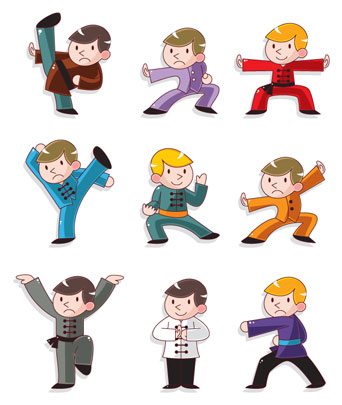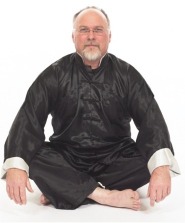Do not over exert – adapt the exercises to suit your capability.
If the instructor says he/she is going to demonstrate, move to a position where you can see what you need to.
Individual positions in the class may be quite loose – make sure that you can see the instructor and have room to move adequately – take care that you do not block the view of others or their practice space. You may need to adjust your position during the course of the class.
There are three types of communication in a Tai Chi class:
• Verbal
• Demonstration
• Physical correction
They are all important – perhaps the most important is physical correction. If you are not comfortable with this then discuss with the teacher but ultimately this will limit your ability to learn and the teacher’s ability to teach.
Equally, you will benefit from knowing which is your left hand and which is your right – if you do not then be sure to copy the teacher attentively. When the teacher is demonstrating pay close attention.
Over the years I have been to classes where the teacher drives students to practice – turn up at every class etc., and to others where no comment is passed beyond encouragement to practice – of the two I far prefer the latter.
We are all adults and can choose to be at a class or not – if you want to train then you turn up. There is little point in talking about it – you are there or you aren’t. Turn up, you are taught – don’t and you aren’t.
In fact talking about it is often only a distraction but many people insist on doing so. Likewise, there is no compulsion to do anything once in the class (although a bit pointless if you don’t) as adult students can decide for themselves. Those choices add up over the years.
As a student you are paying the teacher but really that is not what it is all about – in my experience very few teachers are actually at heart concerned about the money – yes it is an issue but once dealt with then we move onto the training and the sharing of knowledge which is the really important part.
Likewise, with injuries or medical problems, by all means tell your teacher about it but do not expect them to do anything about it or to treat you differently. It is your problem – one of the things that you can learn from Tai Chi practice is how to look after yourself, learn to work within your comfort zone, but also to push the boundary a little in a way that you can handle.
Remember we are all responsible adults here so whatever the teacher says or does is only a suggestion – a sharing of their own experience so that you have an opportunity to find your own experience.
If the teacher seeks to make a physical correction or makes a direct suggestion to you which is outside your comfort zone in a way you choose not to go along with, then is the time to explain – “I have a knee/shoulder/back problem” or whatever. But until you try you do not know – and neither does the teacher.
Learn to look after yourself and take responsibility for your own behaviour.






